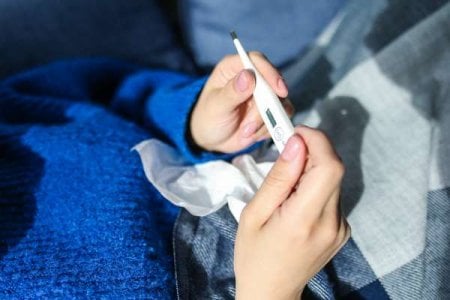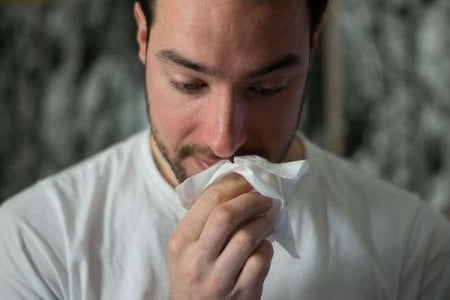Fact or fiction: Do you get sick from not wearing a jumper in the cold?
We recall episodes of being nudged by our mum or grandma, a woollen jumper in hand, worry etched on their face, warning, 'You'll catch your death of cold if you don't wear this!'
As kids, some of us probably ignored it, favouring a stubborn sniffle over spoiling our fun.
Now, as (mostly) responsible adults, we find ourselves echoing the same sentiments. Kind of a funny full circle, isn't it?
Dr Zac Turner, a medical professional, insists that cold weather, despite popular opinion, does not cause illnesses such as the humble cold or flu.
Just think about it. Haven't we all noticed that winters are usually packed with sneezes, sniffles, and people wrapped up in blankets nursing mugs of hot soup or tea?

So why is the winter season synonymous with sickness?
Three aspects: body temperature, proximity to others, and a lack of sunlight.
That's what accounts for your wintertime woes, according to Dr Turner.
'In winter, we tend to be exposed to less sunlight, exercise less, our body temperature dips so we stay indoors—creating a perfect storm for viruses and bacteria to spread, making us sick.' he shared.
So, it's not the icy wind that's the culprit, but the indoor habitat, reduced sun exposure, less physical activity, and lower body temperatures that create a haven for sickness.
Dr Turner points out that viruses generally target the upper respiratory system and spread via droplets or mucus when someone coughs, breathes, talks or sneezes near another person.
As the season turns chilly and noses start running, we start noticing the first signs of flu, like a scratchy throat or a slightly higher temperature. But Dr Turner's advice might make you reconsider your strategy.
Remember how your mum insisted on 'sweating it out' during a fever? Well, it turns out; she might have been on to something.
'A fever isn't such a bad thing—it signals the body is trying to do something by raising the temperature—so rug up, drink hot tea and lie under a blanket for about an hour to fight it off.' he suggests.
Now, why is it called 'cold and flu season’?
During winter, viruses tend to be more severe or potent due to the cooler weather and reduced exposure to harsh sunlight.
However, in the warmer months, people generally engage in more physical activity, which benefits serotonin levels and helps the body combat viruses and bacteria.
Regular exercise increases body temperature during workouts, which can aid in fighting off infections.

Dr Turner shared, 'Instead of working out or sitting in the sun during winter, we stay indoors and don't get much sunshine. Along with this, we are often in more tightly couldn’t find quarters.’
'As you hang around a warm fire [with other people], you're often breathing onto other people who then could turn to absorb a little bit of the virus that you have, ‘cause viruses spread very easily.'
With this in mind, both viruses and bacteria spread more easily during winter, which is why this season is commonly referred to as the 'cold and flu season'.
So, what can we do to avoid falling ill?
Dr Turner also rolls out his secret weapon against incoming infections: a home-brewed remedy using readily available ingredients like ginger and lemon.
To prepare the drink, blend or grate ginger and lemons, including the rind/skin, into a pot. Add 3 to 5 litres of water and bring it to a simmering point, avoiding boiling to retain the vitamin content.
Optionally, you can add grated turmeric. Start drinking this concoction, aiming for a minimum of 3 litres daily.
In addition to the drink, Dr Turner recommends taking Vitamin D, Vitamin C, Vitamin B Complex, and Zinc every four hours.
So, the next time you see someone decide to brave the chill, remember it's less about the weather and more about lifestyle factors.

We encourage you to stay healthy, hydrated, and in high spirits. Here's to fewer sniffles and more hearty laughs this winter.
We'd love to hear from you, members. Share your winter stories, or perhaps your special homemade remedy for cold, in the comments below.
As kids, some of us probably ignored it, favouring a stubborn sniffle over spoiling our fun.
Now, as (mostly) responsible adults, we find ourselves echoing the same sentiments. Kind of a funny full circle, isn't it?
Dr Zac Turner, a medical professional, insists that cold weather, despite popular opinion, does not cause illnesses such as the humble cold or flu.
Just think about it. Haven't we all noticed that winters are usually packed with sneezes, sniffles, and people wrapped up in blankets nursing mugs of hot soup or tea?

Cold and flu cases are respiratory illnesses caused by different viruses, but they share similar symptoms, such as coughing, sneezing, and a runny or stuffy nose. Image by candidbcolette from unsplash
So why is the winter season synonymous with sickness?
Three aspects: body temperature, proximity to others, and a lack of sunlight.
That's what accounts for your wintertime woes, according to Dr Turner.
'In winter, we tend to be exposed to less sunlight, exercise less, our body temperature dips so we stay indoors—creating a perfect storm for viruses and bacteria to spread, making us sick.' he shared.
So, it's not the icy wind that's the culprit, but the indoor habitat, reduced sun exposure, less physical activity, and lower body temperatures that create a haven for sickness.
Dr Turner points out that viruses generally target the upper respiratory system and spread via droplets or mucus when someone coughs, breathes, talks or sneezes near another person.
As the season turns chilly and noses start running, we start noticing the first signs of flu, like a scratchy throat or a slightly higher temperature. But Dr Turner's advice might make you reconsider your strategy.
Remember how your mum insisted on 'sweating it out' during a fever? Well, it turns out; she might have been on to something.
'A fever isn't such a bad thing—it signals the body is trying to do something by raising the temperature—so rug up, drink hot tea and lie under a blanket for about an hour to fight it off.' he suggests.
Now, why is it called 'cold and flu season’?
During winter, viruses tend to be more severe or potent due to the cooler weather and reduced exposure to harsh sunlight.
However, in the warmer months, people generally engage in more physical activity, which benefits serotonin levels and helps the body combat viruses and bacteria.
Regular exercise increases body temperature during workouts, which can aid in fighting off infections.

While colds are usually milder and resolve on their own within a week, the flu can be more severe and may lead to complications, especially in vulnerable populations. Image by Polina Tankilevitch from pexels
Dr Turner shared, 'Instead of working out or sitting in the sun during winter, we stay indoors and don't get much sunshine. Along with this, we are often in more tightly couldn’t find quarters.’
'As you hang around a warm fire [with other people], you're often breathing onto other people who then could turn to absorb a little bit of the virus that you have, ‘cause viruses spread very easily.'
With this in mind, both viruses and bacteria spread more easily during winter, which is why this season is commonly referred to as the 'cold and flu season'.
So, what can we do to avoid falling ill?
Dr Turner also rolls out his secret weapon against incoming infections: a home-brewed remedy using readily available ingredients like ginger and lemon.
To prepare the drink, blend or grate ginger and lemons, including the rind/skin, into a pot. Add 3 to 5 litres of water and bring it to a simmering point, avoiding boiling to retain the vitamin content.
Optionally, you can add grated turmeric. Start drinking this concoction, aiming for a minimum of 3 litres daily.
In addition to the drink, Dr Turner recommends taking Vitamin D, Vitamin C, Vitamin B Complex, and Zinc every four hours.
So, the next time you see someone decide to brave the chill, remember it's less about the weather and more about lifestyle factors.
Key Takeaways
- Dr Zac Turner confirms that cold weather does not cause illnesses such as the common cold or flu.
- The increased prevalence of sickness in winter relates to less sunlight, lower body temperature, decreased exercise, and closer proximity to others, which allows viruses and bacteria to spread more easily.
- Viruses and bacteria abound, especially during winter, due to the strength of their virulence in cooler weather and reduced sunlight.
- Dr Turner suggests a homemade concoction of ginger and lemons for boosting one's immunity and fending off sickness.
We encourage you to stay healthy, hydrated, and in high spirits. Here's to fewer sniffles and more hearty laughs this winter.
We'd love to hear from you, members. Share your winter stories, or perhaps your special homemade remedy for cold, in the comments below.







